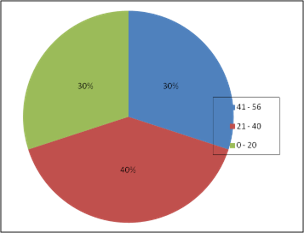Abstract
Falls are a significant cause of morbidity and mortality among the elderly population. In an already overburdened health care system, quick assessment tools can save much time and effort. Assessment of balance is a vital part of geriatric assessment. Due to time constraints in busy clinical settings, there is a need for a rapid balance assessment test. This can be used to screen all elderly patients, following which the detailed Bergs Balance Scale can be used. The study was aimed to correlate the findings of the Bergs Balance Scale with Turn 180 test. A cross-sectional study was conducted consisting of a sample size of 30 subjects in the age group between 60 to 80 years who visited the out-patient department of Alva’s college of physiotherapy. The researcher conducted an interview followed by administration of the Bergs Balance Scale and the Turn 180 test. The scores were recorded and subjected to statistical analysis. Statistical analysis using the Pearson coefficient of correlation revealed that there is a statistically significant correlation between Bergs Balance Scale and turn 180 test. Thus turn 180 test can be used for a quick assessment of balance, and those who score low should be subjected to the Berg's Balance Scale. Fear of falls significantly contributes to falls in the elderly, especially in the high-risk category apart from other causes.
Full text article
Authors

This work is licensed under a Creative Commons Attribution-NonCommercial-NoDerivatives 4.0 International License.

